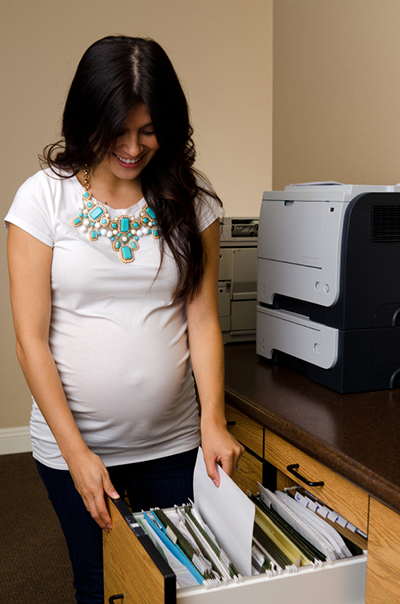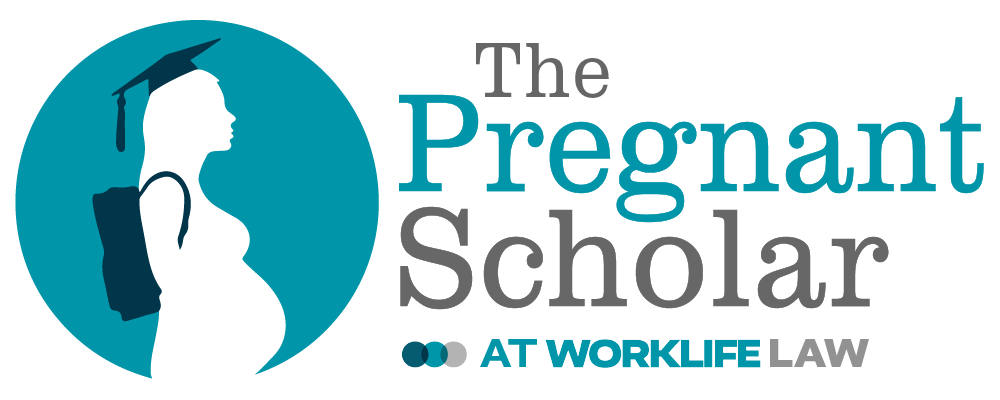
Working at School While Pregnant/Parenting
Hiring and Conditions of Employment
Both federal and state employment laws prohibit employers from basing employment decisions on sex or sex-based characteristics (whether real or perceived). Pregnancy discrimination is illegal, and so is discrimination because of someone’s assumption that you might become pregnant. Law also prohibits discrimination based on stereotypes about how you will or should behave because you are a mother or may become a mother. Under Title IX, schools are also prohibited from asking job applicants about their marital status or penalizing them because of their marital or parental status.
Key federal laws protecting your rights and ensuring non-discrimination include:
- Pregnant Workers Fairness Act
- Title IX
- Americans with Disabilities Act
- Pregnancy Discrimination Act
- Title VII of the Civil Rights Act of 1964
Pregnancy or Parental Leave
Your university likely has its own policies on leave for employees, which may provide for paid or unpaid leave through a maternity, family, or parental leave policy, or through disability benefits. Additionally, employees who need leave for their pregnancy and/or childbirth have a number of protections under the Pregnant Workers Fairness Act, Title IX, the Family and Medical Leave Act, and various disability leave programs.
Job-Protection
Title IX requires that, at minimum, school employees be provided unpaid pregnancy and/or childbirth-related leave for a “reasonable” period of time. Following your leave, you are entitled to be returned to the same status you had when you left, or to a comparable position. Under Title IX, you cannot be penalized for your leave with lower pay or loss of promotion opportunities or other privileges.
In addition to Title IX, many employees have rights under the Family and Medical Leave Act (FMLA), along with state family and medical leave laws. The FMLA provides you with 12 weeks of unpaid leave for pregnancy, childbirth, and baby bonding, and allows you to keep your health insurance, if you meet certain conditions. Most students who work only during the school year would have to work full time to qualify for leave under the FMLA.
Even those employees not eligible under the FMLA have rights to leave as a reasonable accommodation under a law called the Pregnant Workers Fairness Act. Under this law, employees of employers with at least 15 employees are entitled to changes to when, where, and how they work when needed due to pregnancy, childbirth, and related medical conditions.
Learn more about the Pregnant Workers Fairness Act by visiting our sister website, Pregnant@Work.
Paid Leave
The pay that you receive while on leave, if any, will depend on your individual situation. Pregnant and postpartum workers often receive paid leave through their university’s maternity or parental policies, and/or disability insurance.
Typically, workers with uncomplicated pregnancies who have disability benefits through their state or employer are considered eligible for disability benefits within the last month of their pregnancy and after childbirth for 6 weeks (vaginal delivery) to 8 weeks (cesarean delivery). Those who have impairments as a result of their pregnancy or childbirth may be entitled to receive benefits for longer, based on their condition and ability to work. Consult your employment contract or contact your HR department or union representative to learn more.
Click here for more information on federal and state leave laws.
On-the-job accommodations
Most employees have a right to receive changes to how, where, or when their job is done to protect their health and wellbeing when impacted by pregnancy, childbirth, and related conditions. This includes changes you need for:
- Pregnancy symptoms and pregnancy complications
- Infertility
- Miscarriage, pregnancy loss, and abortion
- Childbirth and recovery
- Postpartum depression
- Lactation (breastfeeding/chestfeeding)
To learn how to ask the changes you need, visit our sister website Pregnant@Work.




